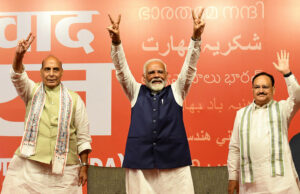Iran declares military deterrence, warns US against miscalculation
In a forceful message following the anniversary of the Islamic Republic, Iran’s Defence Ministry says country’s armed forces have reached a level of strength that puts them beyond the reach of foreign threats
TEHRAN, Iran (MNTV) —Iran’s Defence Ministry has issued a pointed declaration, asserting that the nation’s armed forces have reached a level of deterrence that renders it impervious to foreign military threats.
The statement marks a bold message to the United States and its allies, particularly in the wake of persistent tensions and threats emanating from Washington.
“The Islamic Republic of Iran has built such a powerful deterrent force that enemies can no longer threaten this nation,” the Defence Ministry said in a statement issued following Sunday’s national anniversary.
“Iran will not yield to sanctions, coercion, or military intimidation. Any act of aggression will be met with decisive and crushing retaliation.”
Though the tone was broadly aimed at foreign adversaries, the message was unmistakably directed at the United States—particularly President Donald Trump, whose administration abandoned the 2015 nuclear agreement and reimposed sweeping economic sanctions.
In Tehran, many officials continue to see Trump as emblematic of Washington’s belligerent posture toward Iran.
The Defence Ministry’s warning was part of a wider set of statements issued by key government institutions during and after Sunday’s anniversary celebrations, which marked the 1979 referendum that replaced the monarchy with the Islamic Republic.
Though the official focus of the day was on national unity and sovereignty, the broader political message was that Iran is prepared to confront any external threats head-on.
The Islamic Revolutionary Guards Corps (IRGC) also used the moment to proclaim Iran’s strategic rise and the erosion of U.S. influence in the region.
“The era of American hegemony is fading,” the IRGC declared. “The enemies must now reckon with the resolve of Iran and its allies in the Axis of Resistance.”
Iranian officials also pointed to the high turnout during the recent International Quds Day demonstrations as evidence of the country’s popular resilience and support for its foreign policy positions, particularly in opposition to Israel and in support of Palestine.
Foreign Ministry spokesman Esmaeil Baqaei called the anniversary “a reminder of the Iranian people’s choice for dignity and sovereignty” and warned that Iran would not tolerate “disrespectful or coercive engagement” from any foreign power.
The Constitutional Council added its voice to the growing chorus, warning Washington that “testing the resolve of the Iranian people would be a grave and irreversible mistake.”
Sunday’s anniversary marked 46 years since the 1979 referendum that replaced the Shah’s monarchy with a theocratic republic under the leadership of Ayatollah Ruhollah Khomeini. Government officials noted that 98.2% of voters supported the formation of the Islamic Republic—an outcome they continue to cite as the foundation of the nation’s modern identity and legitimacy.
Yet, unlike previous years where anniversary celebrations were the primary focus, this year’s commemorations were dominated by strategic messaging, aimed squarely at external threats. Observers note that the shift in tone reflects both Iran’s growing military confidence and its acute awareness of regional and global instability.
With tensions once again rising between Tehran and Washington, Iran’s Defence Ministry has chosen to spotlight deterrence over diplomacy—signalling to allies and adversaries alike that the Islamic Republic sees itself not as a target, but as a force to be reckoned with.










